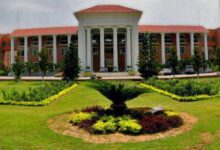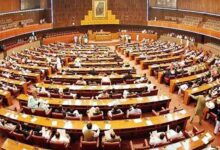CJP Bandial asserts ECP has no authority to extend polls date

ISLAMABAD: The Chief Justice of Pakistan (CJP) Umar Ata Bandial, during hearing of a petition filed by the Pakistan Tehreek-e-Insaf (PTI) against the Election Commission of Pakistan’s (ECP), stated that it is clear that the Election Commission of Pakistan (ECP) has no authority to extend the polling date.
The hearing of a petition filed by the Pakistan Tehreek-e-Insaf (PTI) against the Election Commission of Pakistan’s (ECP) decision to delay elections in Punjab till October 8, was presided over by a five-member larger bench, headed by CJP Bandial, and comprising Justice Ijazul Ahsan, Justice Munib Akhtar, Justice Aminuddin Khan, and Justice Jamal Khan Mandokhail.
At the start of the proceedings, Attorney General of Pakistan (AGP) Usman Awan raised questions over the maintainability of the PTI’s petition, arguing that matters related to the elections should be referred to the Lahore High Court (LHC) after two apex court judges issued their detailed opinion wherein they held that the earlier suo motu in the matter was dismissed by 4 – 3. The AGP also requested the court to constitute a full bench to preside over the case.
However, CJP Bandial stated that the present case was a completely different matter wherein the apex court is examining whether the ECP had the authority to postpone the election date. He observed that the “question before the court is a simple one, can the ECP postpone the election date or not”. “If it has the authority to do so, the proceedings will end right there,” he said.
The AGP argued before the court that two SC judges had given their verdict on the matter earlier, but CJP Bandial held that the opinion expressed by the two judges was not relevant in this matter. The CJP asked Awan to raise these points in a separate application, saying that the issue before the court was not about “the fixing, rather the postponement of the election date”.
Justice Mandokhail remarked that the court would examine how the ECP was empowered to extend the election date. Justice Aminuddin Khan questioned whether the election schedule could be “reduced to less than 90 days”, while Justice Ijazul Ahsan observed that the ECP “has the right to adjust the election schedule within 90 days”, but added that it could not exceed the 90-day limit.
PTI’s lawyer Ali Zafar responded that “prime ministers and chief ministers are elected representatives of the people. “If the premier’s own party wishes to initiate a vote of no confidence against them, then the assembly can be dissolved,” said Justice Mandokhail.
“The first principle of the constitution is Islam and the second is democracy,” the PTI lawyer stressed, “and democracy only exists through elections”. “The ECP has the powers granted under Section 58 to ensure elections,” he added.
“The commission will have to turn to the court to resolve the difficulties it faces,” the judge observed.
CJ Bandial questioned how elections could be delayed “for such a long period” by the electoral body. The CJ stressed the need for “political stability” and “maturity” to hold elections. He remarked that the ECP’s decision was drafted with haste and that the commission had no authority or legal provisions available to extend the election date.
In summary, the hearing of the petition filed by the PTI against the ECP’s decision to delay elections in Punjab till October 8 raised questions about the authority of the ECP to postpone the election date. The AGP argued that the matter should be referred to the LHC, but CJP Bandial disagreed and maintained that the court would examine whether the ECP had the authority to do so.





